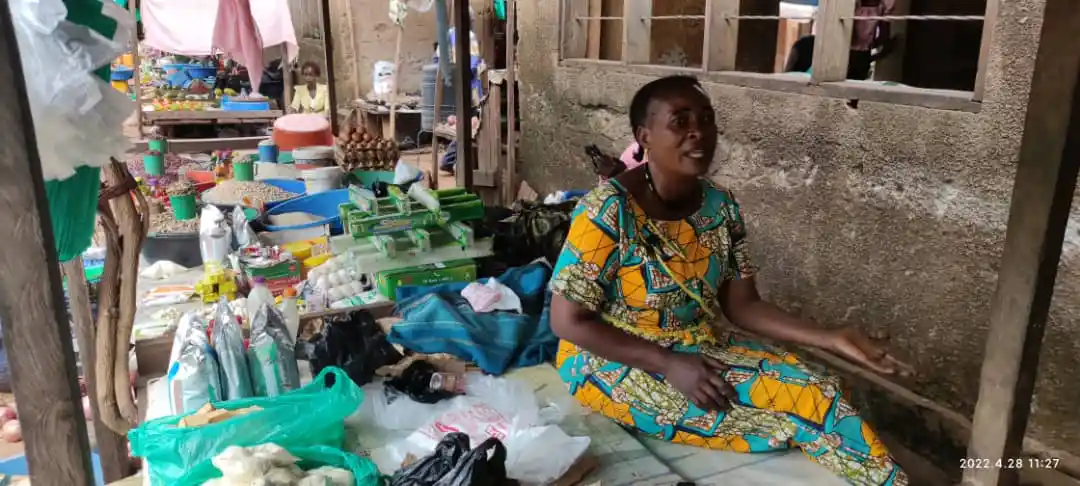
Yambio businesswomen decry bad roads, funding deficiency

Some businesswomen in Yambio town of Western Equatoria State have decried the bad state of the road making transportation of homemade products to the main market difficult.
Mrs Jonnah Nahumba is a woman in her late 20s in Yambio’s main market selling cabbages and palm oil production in Sakole village of Yambio county.
Speaking in her native Zande language, Nahumba said she has regular customers who buy from her and sometimes do not come when caught up. This, she said, leaves her with no choice but to throw the products away.
“I don’t have means of transport to take my produce to the market even to take them to Maridi county within Western Equatoria where they are needed and to Juba and other places are not possible,” she said.
“I can supply many places if there were better road networks. I call upon the state government to avail means of transport to move produces to places where they are needed.”
Another woman Jean Osenub, who is also the chairlady of the women’s association in Western Equatoria state’s Yambio County, sells locally produced soap in Yambio Main Market. She also sells fruits including mangoes and apples. But there are challenges making her not to expanding her business
“Some of the reasons for not expanding my business include lack of enough capital to stock food for export to other states. I don’t have enough capital to take goods to other places. What I have is for sustaining my family,” he explained.
“We have been asking the government a lot of questions; why is there no support from the state government? Am the chairperson of the gender for Yambio county, am the head of women in Yambio but we don’t have any support for women’s businesses,” she decried.
Jean said the majority of women sitting and selling commodities in South Sudan are breadwinners and most of them have lost their husbands.
“My husband is not there and I have children and what I do is what the children are feeding on. Am building my house from the same, paying the school fees for children and there is no bank that gives any loan. Not there at all in Yambio,” she added.
The businesswoman appealed to the government to exempt tax from the women’s businesses and lobby for funds to start better businesses.
“My message to the government is that please pay attention to the suffering women go through in the markets. If there are opportunities that can provide loans to be paid back slowly this will help us to do better businesses and expand to other locations such as Juba and other states.
“Mangoes are falling down here you can see, there is no way we can sell them to other places because we don’t have the capital to transport them to Juba. What you are seeing down here is local soap produced here and it removes pimples on the faces and all skin related infections. This is a project of women in Yambio made from the ingredients of Mbiru oil mixed with chemicals brought from Uganda. If we had capital, we can produce this soap in large quantity,” she said.
Price variations
Yambio is home to a variety of life-sustaining fruits, including mangoes and oranges. The abundance of fruits has made them affordable as compared to the capital Juba.
Six pieces of mangoes in Yambio are sold at SSP100 in the morning and SSP50 in the afternoon hours. If no buyers approach after evening hours, fruits are dumped. In Juba, the same quantity of mango fruits is sold at SSP 500.
Yambio town is the capital of Western Equatoria State with an area of 79,343 square kilometres. It has 10 counties namely; Ezo, Ibba, Maridi, Mundri East, Mundri West, Mvolo, Nagero, Nzara, Tambura and Yambio. Fruits and honey productions are the main local produce from farmers.
In Tambura County, 20 litres of honey is sold at 8,000 SSP [20 USD] in Juba litre of the same honey is 2,000 SSP [5 USD].
In April 2022, three United Nations agencies including the Food and Agriculture Organization, World Food Program and United Nations Children’s Fund issued an alarm warning to donors to avail funds or up to 7.74 million South Sudanese will die of hunger in seven states of Jonglei, Unity, Upper Nile, Lakes, Eastern Equatoria and the Warrap States due to lack of food.
In a joint statement extended to Juba Echo last month, three UN agencies – the WFP, FAO, and UNICEF, said food insecurity is likely to affect South Sudan by seven per cent across the country in the coming months, compared to 2021.
The agencies cited climate shocks and subnational violence as the main drivers of hunger amid low and poor agricultural outputs.
“Climatic shocks (floods and droughts), conflict, economic downturn, displacement and disrupted livelihoods are driving the worsening trend in food security with 7.74 million people (62.7 per cent of the population) across the country slated to face Crisis (IPC Phase 3) or worse levels of acute food insecurity during the lean season between April and July 2022, according to the latest Integrated Food Security Phase Classification (IPC) analysis,” the statement partly read.
Meshack Malo, FAO Country Representative in South Sudan said his organisation will provide the necessary support that contributes to the alleviation of the estimated population from food insecurity.
“To tackle acute hunger, we need to produce more food where it is needed most. FAO will continue to provide seeds, tools and fishing kits to people in urgent need of assistance. We also need increased investment to allow us to find innovative ways to help South Sudanese farmers adapt to climate change so they can grow enough food to meet their nutritional requirements,” he added.
For his part, Alison Barnaba, Western Equatoria’s state minister of Agriculture says his ministry has formed a food security cluster to increase food production.
“We have formed a committee called food security cluster which deals with food security for the community and individual houses holds that is why you have been hearing that Western Equatoria is a food basket.”
His ministry, he says, has distributed tools and seeds to farmers and associations to produce more food for local consumption and export.
“Our food security cluster has been working hard to secure food for every individual in Western Equatoria, Juba and other nine states which we are ready to supply. Investors, we are ready to receive you, our food security cluster has distributed seeds and tools to the farmers, generally, everybody here has food for their families and only 15% of our population goes to the market to sell because they want to pay school fees for their children.
“With the food security cluster, we have secured food for most of the families last year, who paid school fees from the produces and traders who were bankrupt managed to regain capital from the ministry’s initiative.”




































